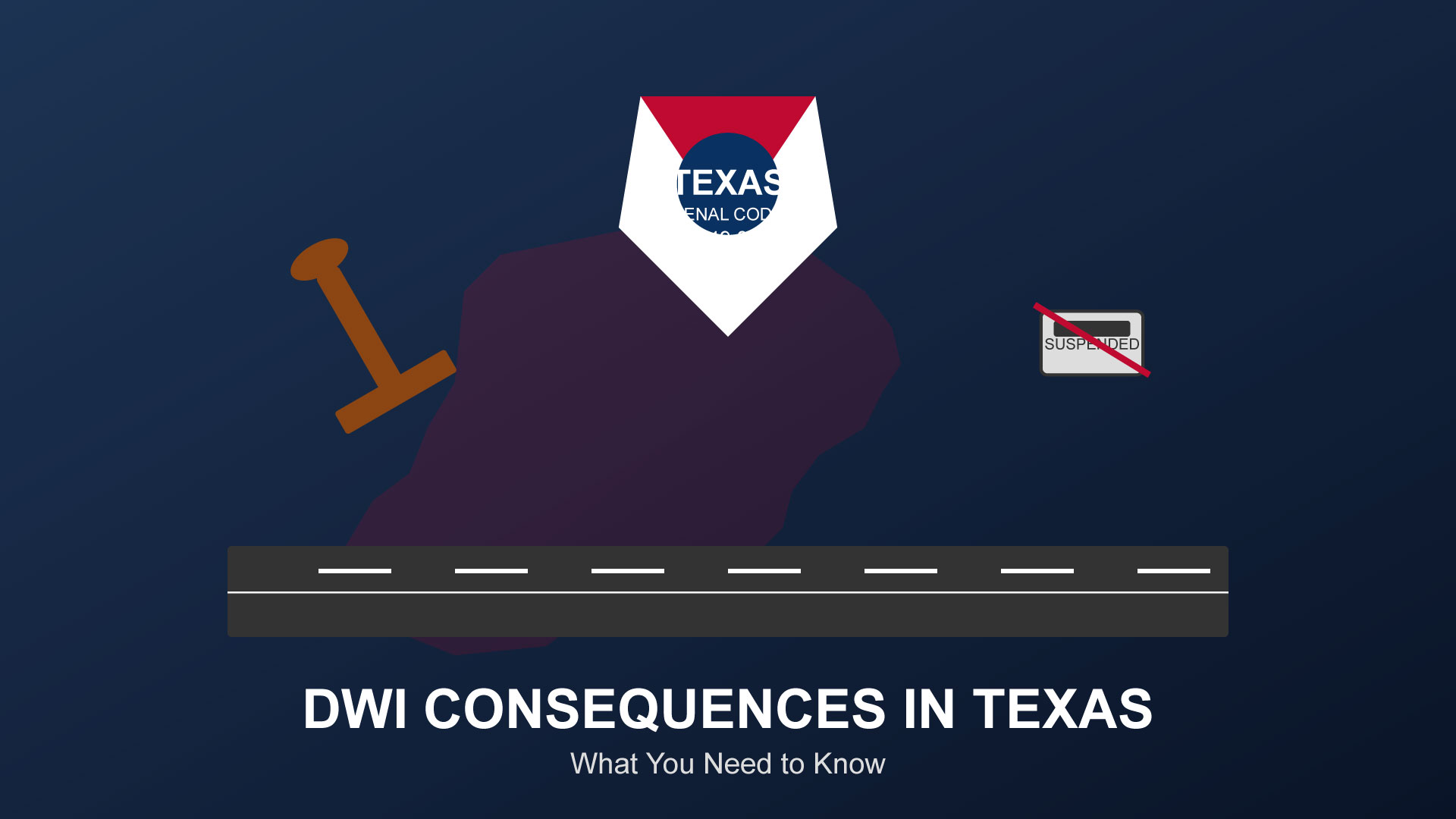 If you’re facing a pending DWI case in Texas, understanding the potential consequences is crucial for making informed decisions about your case. A DWI charge can have far-reaching impacts on your life, from criminal penalties to license suspension and beyond. This article outlines what you need to know about DWI consequences in Texas, with special attention to license suspensions for multiple offenses.
If you’re facing a pending DWI case in Texas, understanding the potential consequences is crucial for making informed decisions about your case. A DWI charge can have far-reaching impacts on your life, from criminal penalties to license suspension and beyond. This article outlines what you need to know about DWI consequences in Texas, with special attention to license suspensions for multiple offenses.
Table of Contents
- Understanding DWI Under Texas Law
- DWI Consequences Table
- First-Time DWI Consequences
- Multiple DWI Offenses: Escalating Consequences
- DWI with a Child Passenger: Serious Enhanced Penalties
- Administrative License Revocation (ALR) Process
- Reinstating Your License
- DWI and Drug Offenses
- Occupational License
- Commercial Driver’s License (CDL) Consequences
- Conclusion
Understanding DWI Under Texas Law
The Texas Penal Code Section at the heart of DWI offenses is Section 49.04, which states:
Texas Penal Code § 49.04 – Driving While Intoxicated
“(a) A person commits an offense if the person is intoxicated while operating a motor vehicle in a public place.
(b) Except as provided by Subsections (c) and (d) and Section 49.09, an offense under this section is a Class B misdemeanor, with a minimum term of confinement of 72 hours.”
According to Texas Penal Code § 49.01(2), “intoxicated” means:
“(A) not having the normal use of mental or physical faculties by reason of the introduction of alcohol, a controlled substance, a drug, a dangerous drug, a combination of two or more of those substances, or any other substance into the body; or
(B) having an alcohol concentration of 0.08 or more.”
DWI Consequences Table
| Offense Type | Criminal Classification | Maximum Fine | Jail/Prison Time | License Suspension | Other Requirements |
|---|---|---|---|---|---|
| First-time DWI | Class B Misdemeanor | $2,000 | 72 hours to 180 days | 90 days to 1 year | – DWI Education Program – SR-22 Insurance for 2 years – $100 Reinstatement fee |
| First-time DWI with Open Container | Class B Misdemeanor | $2,000 | 6 days to 180 days | 90 days to 1 year | – DWI Education Program – SR-22 Insurance for 2 years – $100 Reinstatement fee |
| First-time DWI with BAC ≥ 0.15 | Class A Misdemeanor | $4,000 | Up to 1 year | 90 days to 1 year | – DWI Education Program – SR-22 Insurance for 2 years – $100 Reinstatement fee – Possible IID* |
| Second DWI | Class A Misdemeanor | $4,000 | 30 days to 1 year | 180 days to 2 years | – DWI Intervention Program – SR-22 Insurance for 2 years – $100 Reinstatement fee – Mandatory IID* |
| Third DWI | Third-degree Felony | $10,000 | 2 to 10 years | 180 days to 2 years | – DWI Intervention Program – SR-22 Insurance for 2 years – $100 Reinstatement fee – Mandatory IID* |
| DWI with Child Passenger | State Jail Felony | $10,000 | 180 days to 2 years | 180 days | – DWI Education Program – SR-22 Insurance for 2 years – $100 Reinstatement fee – Mandatory IID* – Potential CPS involvement |
| Intoxication Assault | Third-degree Felony | $10,000 | 2 to 10 years | 180 days to 2 years | – DWI Intervention Program – SR-22 Insurance for 2 years – $100 Reinstatement fee – Mandatory IID* |
| Intoxication Manslaughter | Second-degree Felony | $10,000 | 2 to 20 years | 180 days to 2 years | – DWI Intervention Program – SR-22 Insurance for 2 years – $100 Reinstatement fee – Mandatory IID* |
| Drug Offense | Varies based on substance and amount | Varies | Varies | 90 days | – 15-hour Drug Education Program – $100 Reinstatement fee |
| DWI + Drug Offense (concurrent) | Varies based on charges | Varies | Varies | Stacked suspensions (potentially consecutive) | – DWI and Drug Programs – SR-22 Insurance – Multiple reinstatement fees – Mandatory IID* |
*IID = Ignition Interlock Device
Administrative License Revocation (ALR) Suspensions
| Situation | First Offense | Multiple Offenses within 10 years |
|---|---|---|
| Failed breath/blood test (BAC ≥ 0.08) | 90 days | 1 year |
| Refused breath/blood test | 180 days | 2 years |
First-Time DWI Consequences
If this is your first DWI offense, you’re facing a Class B misdemeanor with several potential consequences:
Criminal Penalties
- Jail time of 72 hours to 180 days
- Fines up to $2,000
- Probation possibilities
Enhanced Penalties
The Texas Penal Code provides for enhanced penalties in certain circumstances:
Texas Penal Code § 49.04(c)
“If it is shown on the trial of an offense under this section that at the time of the offense the person operating the motor vehicle had an open container of alcohol in the person’s immediate possession, the offense is a Class B misdemeanor, with a minimum term of confinement of six days.”
High BAC Enhancement
If your blood alcohol concentration was 0.15 or higher, the penalties become more severe:
Texas Penal Code § 49.04(d)
“If it is shown on the trial of an offense under this section that an analysis of a specimen of the person’s blood, breath, or urine showed an alcohol concentration level of 0.15 or more at the time the analysis was performed, the offense is a Class A misdemeanor.”
License Suspension
The Texas Transportation Code governs license suspensions for DWI offenses:
Texas Transportation Code § 521.344(a)
“Except as provided by Sections 521.342(b) and 521.345, and by Subsections (d)-(i), if a person is convicted of an offense under Section 49.04, 49.045, or 49.07, Penal Code, the license suspension:
(1) begins on a date set by the court that is not earlier than the date of the conviction or later than the 30th day after the date of the conviction, as determined by the court; and
(2) continues for a period set by the court of not less than 90 days or more than one year.”
Multiple DWI Offenses: Escalating Consequences
The Texas justice system takes repeat DWI offenses very seriously, with penalties that increase substantially with each conviction:
Second DWI Offense
Texas Penal Code § 49.09(a)
“Except as provided by Subsection (b), an offense under Section 49.04, 49.05, 49.06, or 49.065 is a Class A misdemeanor, with a minimum term of confinement of 30 days, if it is shown on the trial of the offense that the person has previously been convicted one time of an offense relating to the operating of a motor vehicle while intoxicated…”
The license suspension also increases for second offenses, as stated in the Transportation Code:
Texas Transportation Code § 521.344(a)
“…if a person is convicted of an offense under Section 49.04, 49.045, or 49.07, Penal Code, the license suspension…continues for a period set by the court of not less than 180 days or more than two years.”
Third or Subsequent DWI Offense
Texas Penal Code § 49.09(b)
“An offense under Section 49.04, 49.045, 49.05, 49.06, 49.061, or 49.065 is a felony of the third degree if it is shown on the trial of the offense that the person has previously been convicted:
(1) one time of an offense under Section 49.08 or an offense under the laws of another state if the offense contains elements that are substantially similar to the elements of an offense under Section 49.08; or
(2) two times of any other offense relating to the operating of a motor vehicle while intoxicated…”
A third-degree felony carries penalties including:
- 2-10 years in prison
- Fines up to $10,000
- Extended license suspension of up to two years
DWI with a Child Passenger: Serious Enhanced Penalties
One of the most significant enhancements to a DWI charge occurs when there is a child under 15 years old in the vehicle:
Texas Penal Code § 49.045 – Driving While Intoxicated with Child Passenger
“(a) A person commits an offense if:
(1) the person is intoxicated while operating a motor vehicle in a public place; and
(2) the vehicle being operated by the person is occupied by a passenger who is younger than 15 years of age.
(b) An offense under this section is a state jail felony.”
This enhancement means:
- Punishment range of 180 days to 2 years in a state jail facility
- Fines up to $10,000
- Driver’s license suspension for 180 days to 2 years
Administrative License Revocation (ALR) Process
The Administrative License Revocation (ALR) program is separate from criminal proceedings but has significant impacts on your driving privileges. This process is governed by the Texas Transportation Code:
Texas Transportation Code Chapter 524
“On receipt of a report under Section 524.011, if the officer did not serve a notice of suspension of driver’s license at the time the results of the analysis of a breath or blood specimen were obtained, the department shall determine from the information in the report whether to suspend the person’s driver’s license.”
Key points about the ALR process:
- You have 15 days from the date of arrest to request an ALR hearing
- If you don’t request a hearing, your license suspension automatically goes into effect on the 40th day after arrest
- The ALR hearing is separate from your criminal case
The length of license suspension varies based on whether you refused or failed a blood or breath test and whether you have prior offenses:
Texas Transportation Code § 724.035 – License Suspension
For refusal to provide a specimen:
- First offense: 180 days
- Prior alcohol-related contacts within 10 years: 2 years
For providing a specimen showing a BAC of 0.08 or more:
- First offense: 90 days
- Prior alcohol-related contacts within 10 years: 1 year
Reinstating Your License
To reinstate your license after suspension, you must meet several requirements as outlined in the Transportation Code:
Texas Transportation Code § 524.051 – Reinstatement and Reissuance
“(a) A driver’s license suspended under this chapter may not be reinstated or another driver’s license issued to the person until the person pays the department a fee of $125 in addition to any other fee required by law.”
Additional requirements include:
- Completing the suspension period
- Completing a DWI education program (required as a condition of probation for first offenses)
- Obtaining SR-22 insurance (a special certificate of financial responsibility)
- Installing an ignition interlock device if required by the court
DWI and Drug Offenses
When a DWI charge is combined with a drug offense, or when you have prior drug convictions, the consequences can stack up, creating a more complex legal situation. Two primary scenarios require special attention:
Pending DWI with Prior Drug Conviction
If you have a prior drug conviction and are now facing a DWI charge, you may experience enhanced penalties and additional license suspensions.
Texas Transportation Code § 521.372 – Suspension or License Denial
“(a) A person’s driver’s license is automatically suspended on final conviction of:
(1) an offense under the Controlled Substances Act;
(2) a felony drug offense;
(3) a misdemeanor drug offense, if the person has been previously convicted of a drug offense committed less than 36 months before the commission of the instant offense; or
(4) a felony under Chapter 481, Health and Safety Code, that is not a drug offense.”
This means that if you have a prior drug conviction (especially within 36 months), your current DWI case could result in additional license suspensions. The standard suspension for drug offenses is 90 days, which would run separate from and potentially consecutive to any DWI-related suspensions.
Additionally, if your DWI involved drugs rather than alcohol, or a combination of both, this could affect how the case is prosecuted and the resulting penalties, especially with prior drug convictions on your record.
Concurrent Pending DWI and Drug Charges
If you’re facing both DWI and drug charges from the same incident or separate but concurrent cases, the license suspensions can stack. For example:
- Your DWI charge could result in a license suspension of 90 days to 1 year
- Your drug charge could trigger an automatic additional 90-day suspension under Transportation Code § 521.372
- If you refused a breath or blood test during your DWI arrest, you could face an additional administrative suspension of 180 days
These suspensions typically run consecutively rather than concurrently, meaning you could be without your license for an extended period.
Moreover, when both DWI and drug charges are pending simultaneously, the court may view this as a pattern of substance abuse issues, potentially leading to more stringent conditions for probation, including:
- More intensive treatment programs
- More frequent drug and alcohol testing
- Longer probation periods
- More restrictive ignition interlock device requirements
Drug-Related DWI Considerations
If your DWI charge involves drugs rather than alcohol, there are additional considerations:
- Drug testing and evidence may be more complex than alcohol testing
- The definition of “intoxication” still applies even if no alcohol was involved
- You may be required to complete drug-specific education or treatment programs
- If you have both alcohol and drugs in your system, the court may view this as a more serious offense
Occupational License Limitations
When facing multiple suspensions from both DWI and drug offenses, obtaining an occupational license becomes more challenging. According to Texas law, you may only receive one occupational license in a 10-year period, which can limit your options if you face stacked suspensions.
Additionally, there are “hard suspension” periods during which you cannot obtain an occupational license at all:
“If you have received a license suspension within the preceding five years for a drug or alcohol-related contact with law enforcement, there’s an initial 90-day ‘hard suspension’ period during which you won’t be able to drive at all. And if your law enforcement contact was within the preceding five years, your hard suspension increases to 180 days.”
This means if you have both DWI and drug charges, your ability to legally drive during the suspension periods may be severely limited.
Occupational License
If your license is suspended, you may be eligible for an occupational license (also called an “essential need” license):
Texas Transportation Code § 521.242 – Petition
“A person whose license has been suspended for a cause other than a physical or mental disability or impairment or a conviction under Section 49.04, Penal Code, may apply for an occupational license by filing a verified petition with the clerk of a justice, county, or district court with jurisdiction that includes the precinct or county in which:
(1) the person resides; or
(2) the offense occurred for which the license was suspended.”
This license allows limited driving for:
- Work-related transportation
- Essential household duties
- Educational purposes
Commercial Driver’s License (CDL) Consequences
For CDL holders, the consequences are especially severe:
Texas Transportation Code § 522.081 – Disqualification
“A person who holds or is required to hold a commercial driver’s license is disqualified from driving a commercial motor vehicle for:
(1) one year if the person is convicted of:
(A) an offense under Section 49.04, 49.045, or 49.07, Penal Code…
(B) an offense involving the use of a motor vehicle other than a commercial motor vehicle…and is convicted of an offense under Section 49.04, 49.045, 49.07, or 49.08, Penal Code;”
A second conviction of DWI or related offenses results in lifetime disqualification from holding a CDL.
Conclusion
If you’re facing a DWI charge in Texas, especially one complicated by prior or concurrent drug offenses, the potential consequences are serious and far-reaching. Understanding these consequences is essential for making informed decisions about your case.
License suspensions can stack up quickly when multiple offenses are involved, potentially leaving you without legal driving privileges for extended periods. This can impact your ability to work, meet family obligations, and maintain your lifestyle.
Remember that each case is unique, and many factors can influence the specific consequences you might face. This information provides a general overview based on the Texas Penal Code and Transportation Code. Consulting with a qualified attorney can help you understand your specific situation and potential defenses, especially when dealing with the complex interplay between DWI and drug offenses.


